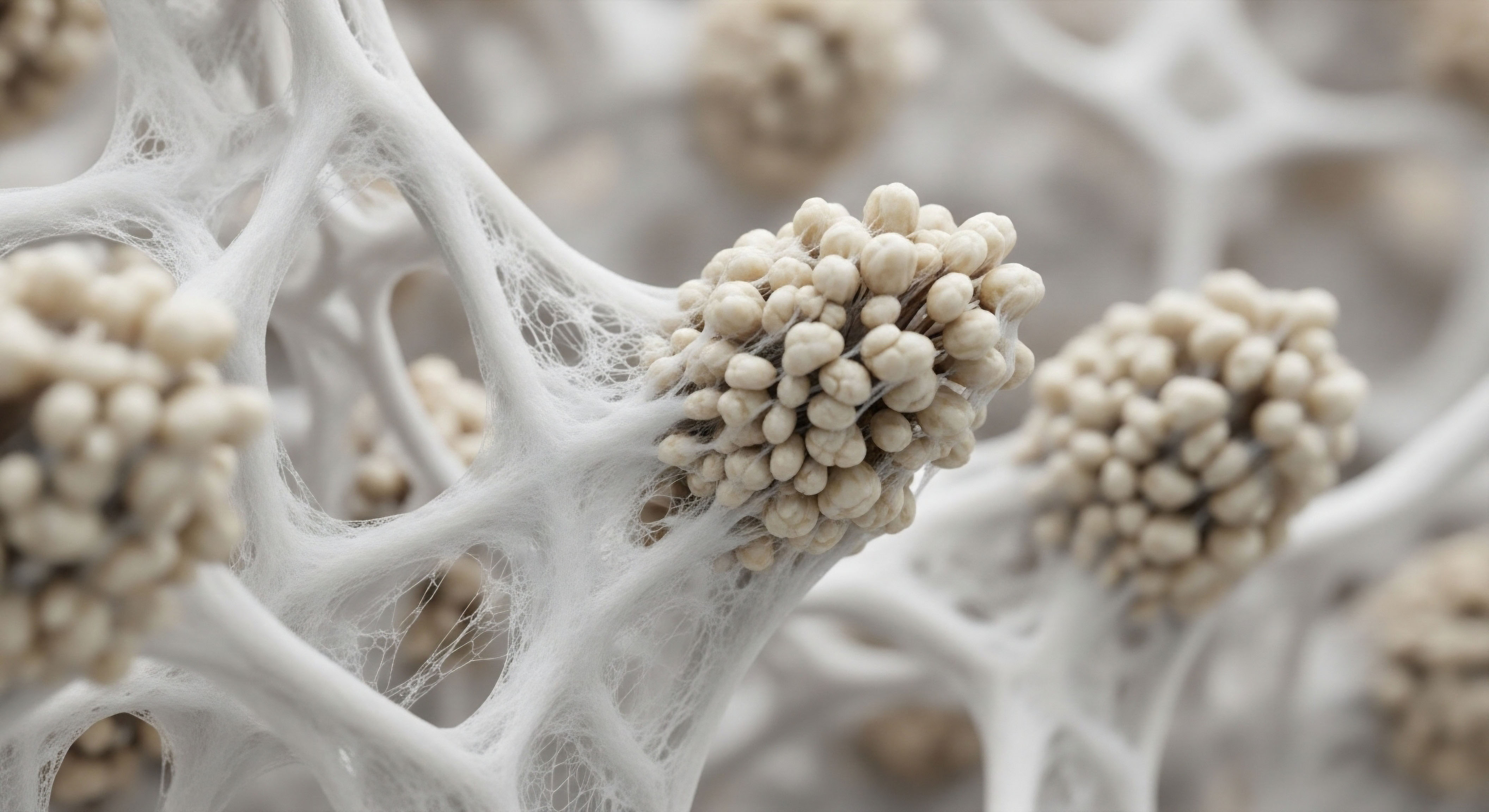

Fundamentals
The journey toward understanding your own vitality often begins with a subtle shift in perception, moving from the broad strokes of how you feel to the intricate cellular narratives unfolding within. Many individuals experience a gradual decline in energy, shifts in metabolic balance, or a diminished sense of well-being, symptoms that frequently signal deeper biological recalibrations. This lived experience of changing function holds profound clinical significance, serving as a compass pointing toward the underlying mechanisms governing cellular longevity.
At the very heart of this cellular longevity lie telomeres, repetitive DNA sequences forming protective caps at the ends of your chromosomes. These structures shield your genetic material from degradation and fusion during cell division, much like the plastic tips on shoelaces prevent fraying.
Each time a cell divides, a small segment of these telomeric sequences is typically lost. When telomeres shorten to a critical length, cells can no longer divide effectively, entering a state of senescence or programmed cell death. This process fundamentally influences cellular health and, by extension, your overall physiological resilience.
Telomeres, the protective caps on chromosomes, serve as vital markers of cellular longevity, reflecting the cumulative impact of life’s biological stressors.
The rate at which telomeres shorten is not predetermined solely by chronological age. It represents a dynamic interplay between inherited predispositions and the cumulative impact of daily choices. Factors such as persistent oxidative stress, a state of imbalance between free radicals and antioxidants in the body, and chronic systemic inflammation significantly accelerate telomere attrition.
These cellular aggressors arise from various lifestyle inputs, directly influencing the integrity of these chromosomal safeguards. Understanding these foundational biological principles offers an empowering lens through which to view your personal health journey, revealing avenues for proactive engagement and recalibration.


Intermediate
Recognizing the foundational role of telomeres in cellular health, we move to the practical dimension of how daily lifestyle choices translate into measurable biological effects. The decisions made regarding nutrition, physical activity, stress modulation, and sleep architecture exert a profound influence on telomere maintenance. These elements are not isolated variables; they interact within a complex adaptive system, collectively shaping the cellular environment and its capacity for repair and regeneration.

Nutrition as a Telomere Modulator
Dietary patterns exert a significant influence on telomere length, primarily through their impact on oxidative stress and inflammatory pathways. A diet rich in antioxidant compounds and anti-inflammatory nutrients actively supports telomere preservation. The Mediterranean diet, characterized by a high intake of fruits, vegetables, whole grains, legumes, nuts, and olive oil, consistently associates with longer telomeres.
These dietary components provide a wealth of micronutrients and phytochemicals that neutralize reactive oxygen species and dampen inflammatory responses, thereby reducing the cellular burden that accelerates telomere shortening.
Conversely, dietary patterns high in processed foods, refined sugars, and unhealthy fats promote systemic inflammation and oxidative stress. This creates an environment conducive to accelerated telomere attrition. Excessive sugar intake, for example, can directly influence cardiometabolic disease progression, a pathway also linked to hastened telomere shortening. Thoughtful dietary choices, therefore, stand as a cornerstone of cellular protection.
Beneficial dietary components for telomere health include:
- Antioxidant-Rich Foods ∞ Berries, dark leafy greens, colorful vegetables.
- Omega-3 Fatty Acids ∞ Found in fatty fish, flaxseeds, and walnuts, these compounds possess anti-inflammatory properties.
- Fiber ∞ Whole grains, legumes, and vegetables contribute to gut health, influencing systemic inflammation.
- Polyphenols ∞ Present in green tea, dark chocolate, and red wine (in moderation), these plant compounds offer protective effects.

Physical Activity and Telomere Dynamics
Regular physical activity represents a potent intervention for telomere maintenance. Studies indicate that individuals engaging in consistent exercise tend to exhibit longer telomeres compared to sedentary counterparts. The mechanisms involve reductions in systemic inflammation and oxidative stress, alongside enhancements in telomerase activity ∞ the enzyme responsible for adding repetitive DNA sequences to telomere ends.
Aerobic exercise, particularly when sustained for more than six months, demonstrates a beneficial effect on telomere length. High-intensity interval training (HIIT) also shows promise in this regard, suggesting that diverse modalities of movement contribute to cellular resilience.
Consistent physical activity, especially aerobic exercise, reduces cellular stressors and can activate telomerase, promoting telomere maintenance.
The optimal dose and type of exercise remain areas of ongoing investigation. However, the consistent finding points toward a clear association between an active lifestyle and preserved telomere integrity, particularly evident in older adults where physical activity appears to buffer age-induced telomere decrements. This underscores the principle that movement, a fundamental human need, directly translates into cellular health benefits.

The Endocrine System and Telomere Interplay
The endocrine system, a sophisticated network of glands and hormones, orchestrates virtually every physiological process, including those influencing cellular aging. Hormonal balance plays a critical role in mitigating the cellular stressors that impact telomere length. Dysregulation within this system, such as that seen in metabolic syndrome or age-related hormonal decline, can accelerate telomere attrition.
For example, insulin resistance, a hallmark of metabolic syndrome, contributes to telomere shortening through increased oxidative stress and inflammation. This connection highlights the profound interconnectedness of metabolic and cellular health.
Here is a summary of how various lifestyle factors impact telomere length:
| Lifestyle Factor | Impact on Telomere Length | Underlying Mechanism |
|---|---|---|
| Mediterranean Diet | Positive (longer) | Reduced oxidative stress, anti-inflammatory properties |
| Processed Foods, Sugars | Negative (shorter) | Increased systemic inflammation, oxidative stress |
| Aerobic Exercise | Positive (longer) | Reduced oxidative stress, inflammation, enhanced telomerase activity |
| Chronic Psychological Stress | Negative (shorter) | Elevated cortisol, increased inflammation, oxidative stress |
| Insufficient Sleep | Negative (shorter) | Increased stress on the body, impaired cell recovery |

Stress Management and Sleep Architecture
Chronic psychological stress creates a sustained physiological burden, activating neuroendocrine pathways that can hasten telomere shortening. Elevated levels of stress hormones, such as cortisol, contribute to increased oxidative stress and systemic inflammation, directly impacting telomere integrity. Mindfulness-based stress reduction techniques, meditation, and other cognitive behavioral interventions have demonstrated the capacity to mitigate these stress responses, potentially preserving telomere length.
Similarly, adequate and restorative sleep is paramount for cellular repair and regeneration. Insufficient sleep patterns impose significant stress on the body, contributing to heightened oxidative stress and inflammation, which in turn accelerate telomere attrition. Prioritizing consistent, high-quality sleep represents a fundamental strategy for supporting cellular longevity and overall physiological balance.


Academic
A deeper exploration into the impact of lifestyle choices on telomere length necessitates a sophisticated understanding of the intricate biological axes and molecular pathways involved. The endocrine system, with its pervasive regulatory influence, stands as a central orchestrator of cellular environments, profoundly affecting telomere dynamics. Our focus here delves into the specific mechanisms by which hormonal balance, metabolic function, and targeted peptide interventions modulate telomere integrity, thereby influencing biological aging and overall vitality.

The Endocrine System as a Telomere Regulator
The interplay between various endocrine signals and telomere biology is a complex and dynamic field of study. Hormones do not operate in isolation; they form an interconnected web of feedback loops that influence cellular proliferation, repair, and stress responses, all of which ultimately bear upon telomere maintenance.

Sex Hormones and Telomerase Activity
Sex hormones, particularly estrogens and androgens, exert significant influence over telomere length and telomerase activity. Estrogen, often associated with female longevity, demonstrates protective effects on telomeres. Research indicates that estrogen can upregulate telomerase activity and shield telomeres from oxidative damage through various mechanisms, including free radical scavenging and the stimulation of nitric oxide. Long-term hormone therapy in postmenopausal women, incorporating estrogen and progesterone, has shown associations with longer telomere lengths, suggesting an attenuation of age-related telomere attrition.
Androgens, including testosterone and its derivatives such as dihydrotestosterone (DHT) and estradiol (E2), also play a critical role. Studies in men reveal that specific levels of estradiol correlate with longer telomeres, suggesting a protective effect. Testosterone itself, through its conversion to these potent metabolites, contributes to the regulation of telomerase expression and activity. This highlights the importance of a balanced endocrine milieu for both male and female cellular health.

Metabolic Health and Telomere Attrition Mechanisms
Metabolic dysfunction, particularly the constellation of conditions comprising metabolic syndrome, directly accelerates telomere shortening through well-defined molecular mechanisms. Insulin resistance, a core component, drives telomere attrition by promoting cellular proliferation and DNA replication, increasing the burden on telomere maintenance. Elevated levels of oxidative stress and chronic low-grade inflammation, characteristic of metabolic syndrome, inflict direct damage to telomeric DNA and inhibit telomerase activity.
Obesity, often intertwined with metabolic syndrome, further exacerbates telomere shortening. It accomplishes this through increased systemic inflammation, oxidative burst, and dysregulated adipokine production, which collectively impair telomere integrity. The sustained inflammatory response and oxidative burden in these conditions create an environment where telomeres are under constant assault, hastening cellular senescence.
Metabolic dysregulation, marked by insulin resistance and inflammation, significantly accelerates telomere shortening through direct cellular damage and impaired repair mechanisms.

Targeted Peptide Interventions for Telomere Support
Beyond broad lifestyle modifications, specific clinical protocols involving targeted peptides offer a more direct approach to influencing telomere biology. These interventions operate by modulating key physiological pathways, often interacting with the endocrine system to promote cellular repair and regeneration.
Key peptides and their proposed telomere-related actions:
- Epitalon ∞ This synthetic peptide, derived from the pineal gland, demonstrates the ability to activate telomerase. Research indicates that Epitalon can epigenetically regulate gene expression and has been associated with improved cellular longevity and telomere length in various models.
- Growth Hormone-Releasing Hormone (GHRH) Analogs (Sermorelin, Ipamorelin/CJC-1295) ∞ These peptides stimulate the pituitary gland to produce and release endogenous growth hormone. While not directly acting on telomeres, optimizing growth hormone levels can improve body composition, mitochondrial function, and cellular repair, indirectly supporting cellular environments conducive to telomere maintenance. Studies on GHRH antagonists have shown positive effects on telomerase activity and reduced oxidative stress.
- Pentadeca Arginate (PDA) ∞ While primarily known for tissue repair and anti-inflammatory properties, a robust reduction in systemic inflammation can indirectly alleviate a major driver of telomere attrition.
The following table summarizes the proposed mechanisms of specific hormonal and peptide interventions on telomere length:
| Intervention | Primary Hormonal/Peptide Action | Proposed Telomere Effect |
|---|---|---|
| Estrogen Replacement | Antioxidant, telomerase upregulation, NO stimulation | Attenuates telomere attrition, promotes longer telomeres |
| Testosterone Replacement | Conversion to DHT/Estradiol, telomerase regulation | Associated with telomere protection, especially under stress |
| Epitalon | Telomerase activation, epigenetic regulation | Increases telomerase activity, promotes longer telomeres |
| GHRH Analogs (e.g. Sermorelin) | Stimulates endogenous Growth Hormone release | Indirectly supports cellular repair, mitochondrial function, reducing telomere stressors |
These sophisticated protocols represent a frontier in personalized wellness, offering avenues to address the biological underpinnings of cellular aging. The precision of these interventions, combined with a comprehensive understanding of an individual’s unique hormonal and metabolic landscape, allows for targeted strategies aimed at preserving telomere integrity and enhancing long-term vitality. The clinical translator’s role involves deciphering these complex interactions, guiding individuals toward informed choices that resonate with their deepest health aspirations.

References
- Kim, Y. S. et al. “Effect of Long-Term Hormone Therapy on Telomere Length in Postmenopausal Women.” Yonsei Medical Journal, vol. 46, no. 4, 2005, pp. 471-477.
- Yeap, B. B. et al. “Sex Hormone in Males Linked to Slower Biological Aging in New Study.” Clinical Endocrinology, 2019.
- Epel, E. S. et al. “Telomeres and Stress ∞ Promising Avenues for Research in Psycho-Oncology.” Current Opinion in Oncology, vol. 22, no. 5, 2010, pp. 487-492.
- Boccardi, V. et al. “Nutrition and Lifestyle in Healthy Aging ∞ The Telomerase Challenge.” Aging, vol. 8, no. 1, 2016, pp. 12-15.
- Denham, J. and Sellami, M. “Scientists Find Exercise Protects Against Age-Related Attrition of Chromosome Ends.” Ageing Research Reviews, 2021.
- Shakeri, H. et al. “Does Exercise Affect Telomere Length? A Systematic Review and Meta-Analysis of Randomized Controlled Trials.” Journal of Clinical Medicine, vol. 11, no. 3, 2022, p. 687.
- Gavia-García, G. et al. “Telomere Length and Oxidative Stress and Its Relation with Metabolic Syndrome Components in the Aging.” Antioxidants, vol. 10, no. 8, 2021, p. 1210.
- Sadeghian, M. et al. “The association of metabolic syndrome with telomere length as a marker of cellular aging ∞ a systematic review and meta-analysis.” Frontiers in Endocrinology, 2024.
- Khavinson, V. K. et al. “Epitalon Peptide Modulates Telomerase to Support Cellular Longevity.” Neuro Endocrinology Letters, vol. 29, no. 3, 2008, pp. 367-371.
- Popov, A. V. et al. “Effects of a growth hormone-releasing hormone antagonist on telomerase activity, oxidative stress, longevity, and aging in mice.” Proceedings of the National Academy of Sciences, vol. 108, no. 10, 2011, pp. 4117-4122.

Reflection
The exploration of telomere biology and its intricate relationship with lifestyle choices offers a profound invitation to introspection. Your personal health journey is a dynamic interplay of biological predispositions and the daily decisions that sculpt your cellular destiny.
Understanding these mechanisms represents a powerful first step, a foundational knowledge that empowers you to view symptoms and concerns not as isolated incidents, but as signals from an interconnected system. This scientific understanding, blended with a deep awareness of your own unique physiological landscape, opens pathways to reclaim vitality and function.
The true strength lies in leveraging this knowledge to construct a personalized wellness protocol, one that resonates with your aspirations for sustained health and unwavering resilience. Your engagement with these principles marks the beginning of a deliberate, informed path toward optimizing your biological systems, ensuring a future where well-being is not compromised.



